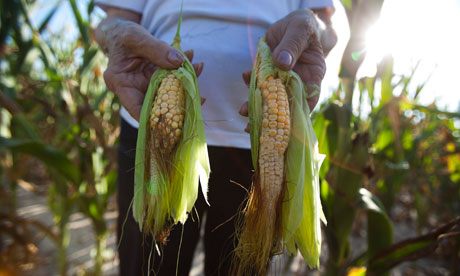

| Visitors Now: | |
| Total Visits: | |
| Total Stories: |

| Story Views | |
| Now: | |
| Last Hour: | |
| Last 24 Hours: | |
| Total: | |
Drought in U.S. today, trouble for world tomorrow
Posted by contributor Andres Santamaria.
The recent drought that has been spreading throughout the Midwest portion of the United States could now potentially create another global food crisis like the one in 2008, according to an article by Suzanne Goldenberg, U.S. environment correspondent for the Guardian.
Why is there such a danger now? Extreme heat has shriveled corn fields, hampering the growth of corn crops. With corn supply down, corn prices rise; making exports from the U.S. towards the global market steadily decline. Many people in countries that depend on food imports such as El Salvador, South Korea, Japan, Columbia and much of East Africa will suffer as a result of the current rise in prices related to the drought in the U.S.
With the U.S. being the largest producer of corn, this will have a major effect on the cost of feeding livestock around the world, as well.
Just as the prices of rice and wheat rose in 2008 to set off the crisis, it is predicted that corn will undergo a similar phase in the near future. Goldenberg points out that food experts recall how the surge in prices in 2008 “…set off riots and unrest to parts of Africa, the Middle East, and Latin America.”
Goldenberg quotes Marie Brill, a policy analyst at Action Aid, “What’s difficult is that we see a drought happen today but people really are going to be feeling that six months from now, possibly a year from now.”
Bryan Walsh writes in Time magazine that one inadvertent beneficiary of the drought may be farmers in the U.S., who will receive larger payments for the corn they can grow. Others will be eligible for insurance payments to offset their losses.
“If those farmers took out insurance plans with a harvest price option, they’ll be paid for the crops destroyed by drought at the price they would have fetched at the market — prices that are much higher than they would otherwise have been thanks to that same drought.”
2012-08-14 11:04:56
Source:




